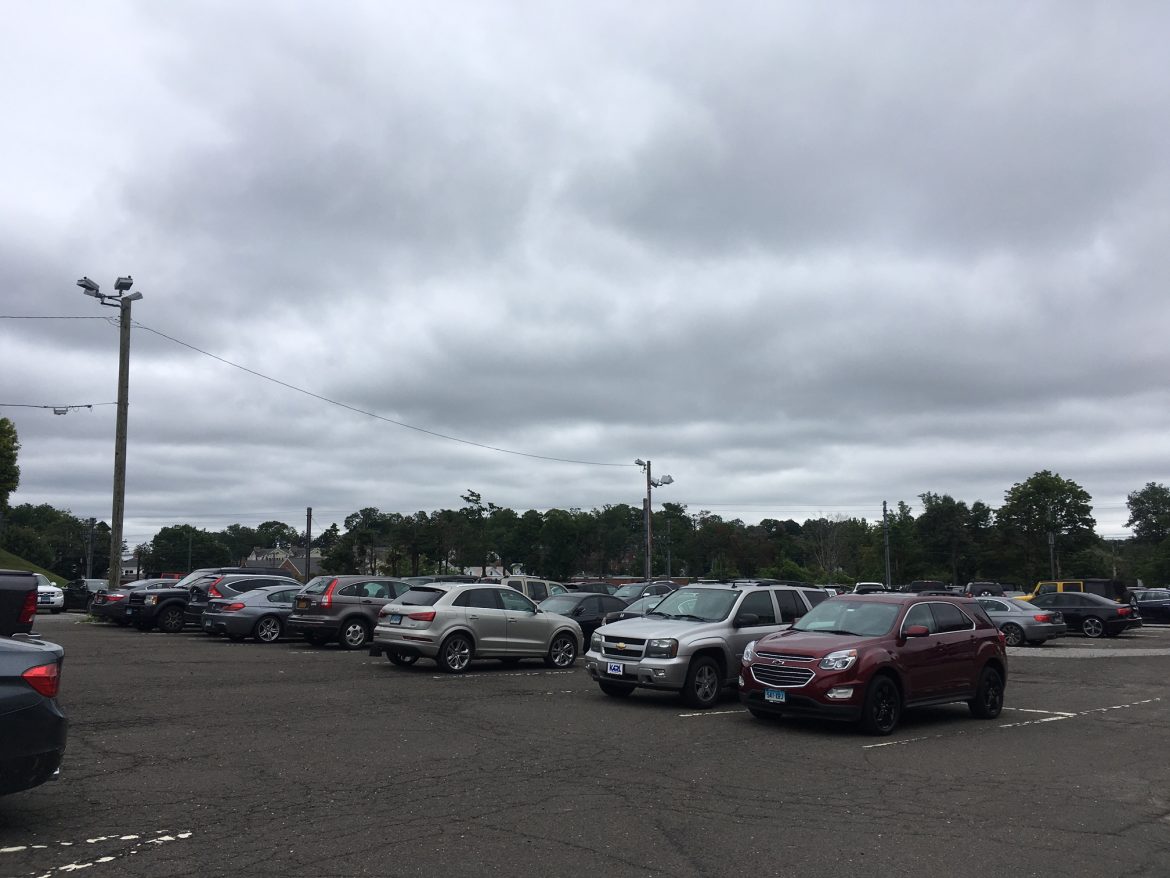Demand for commuter parking lots near the Metro-North Railroad line is still in flux and remains low overall compared to pre-COVID figures, officials say, as New Canaan residents try to figure out whether it makes sense to purchase an annual permit or use daily pay spaces as needed.

The Lumberyard Lot emptied out as fewer commuters used it during the pandemic. This photo from May 19, 2021. Credit: Hannah Tiller
On a given Tuesday, Wednesday or Thursday, lots such as the Lumberyard downtown are at least two-thirds full—less so on Mondays and Fridays, according to Parking Manager Stacy Miltenberg.
Yet renewals for permits are down this year as increasing number of permit-holders ask to be listed on a “deferral list” that allows them to put off a decision until next summer, Miltenberg told members of the Parking Commission at their regular meeting last week.
It’s unclear “how often people are commuting,” Miltenberg said at the Oct. 6 meeting, held via videoconference.
Though some residents who moved here during the pandemic are coming in for an initial permit at the Talmadge Hill Lot, the town is seeing a bigger change in the Boxcar spaces at St. Aloysius Church and pay-daily spaces with both Lumberyard and Talmadge “being fully utilized,” she said.
“It’s still very hard for me to judge how the commuting is coming back, at least from my perspective,” Miltenberg said. “I tried to kind of get an insight when somebody comes in and they are renewing their permit. It still seems like the maximum number of days is three days a week. I think what people are still trying to figure out is whether it’s beneficial to get a permit or to use the pay daily spaces, and I think people are still trying to figure out the cost of which one is better.”
Like other commuter towns, New Canaan saw a significant drop-off in demand for parking lots along the rail line as COVID-19 set in. The town didn’t charge for parking immediately after the pandemic hit, and this year decided to hold its rates steady for the parking permit year, which runs Sept. 1 to Aug. 31.
Overall, the town did well in terms of renewals, Miltenberg said, with 83.7% of permit-holders in the Lumberyard renewing, 91.1% in Talmadge Hill and 52.9% at Richmond Hill. Yet the number of people renewing is down again this year, from 454 to 380 at Lumberyard, 259 to 236 at Talmadge Hill and 17 to nine at Richmond Hill, she said.
Commissioner Nancy Bemis asked Miltenberg what the town could do to help residents make a calculation and decision regarding renewals.
“It might be worthwhile, because everything is changing,” Bemis said. “We are doing this whole ‘Return to Work’ study at my company and every day you pick up the paper that more and more companies are requiring more people to come back and obviously from the labor force there’s pushback. But they are trying to institute different ways and models, so I imagine in 2023 they will do it even more.”
Commissioner Jennifer Donovan, acting chair of the appointed body, wondered just how the town is communicating out the various rates.
“I mean, our newspapers are terrible now,” she said. “They don’t do anything local. How do we disseminate information to people that live in New Canaan now?” She referred to print publications.
Miltenberg said the town website could be used for that purpose. Town employee Tucker Murphy, a guest at the meeting, said the municipality also is trying to build an email list that covers all households in New Canaan.
The town charges $663.62 for an annual permit at the Lumberyard/Railroad Lot, and $504.10 at Richmond Hill and Talmadge Hill. Daily pay spaces at the Railroad Lot cost a flat rate of $6, covering a motorist through 11:59 p.m., while metered spaces at Talmadge Hill cost $5.50 for the day.
As of Sept. 1, 403 people had deferred their permit renewal to the end of August 2023, Mitlenberg said—they’ve had two years to get onto the “deferral list”—and it remains unclear how many of those residents will pursue a renewal next summer.
Commissioner Marley Thackray asked whether the town should look into incentivizing those on the deferral list to purchase a permit.
Commissioner Drew Magratten said that with high inflation and a possible recession, those working in finance likely are wondering about their own job security. Demand for the commuter lots likely will not ever go back to five days per week, Magratten said.
“I think three [days],” he said.

